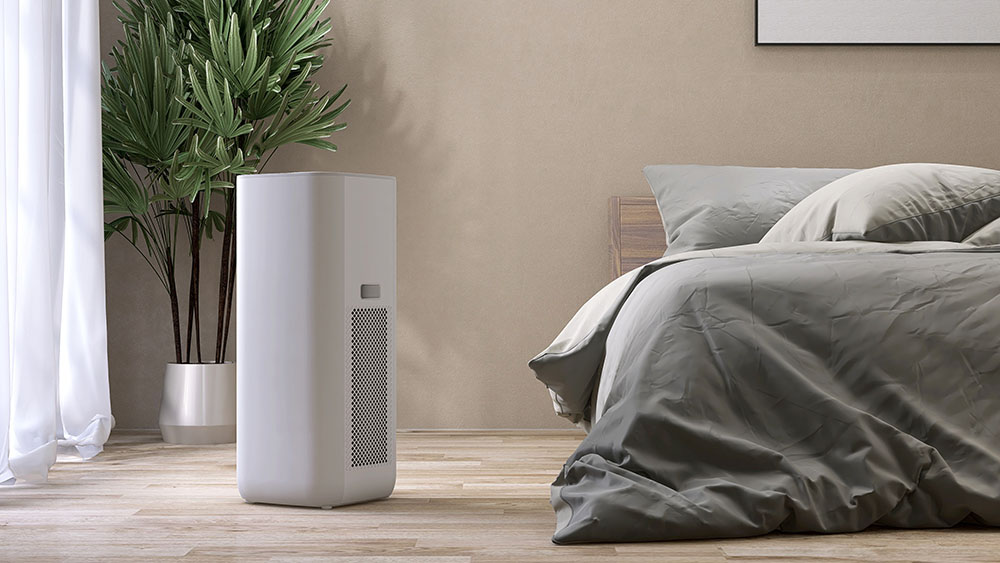What Type Of Dehumidifier Do You Need?

CONTENTS
- Understanding dehumidifier types
- Assessing room size and dehumidifier capacity
- Evaluating humidity levels for dehumidifier selection
- Advanced features in modern dehumidifiers
- Noise level considerations
- Maintenance requirements and ease of use
- Brand reputation and consumer reviews
- Frequently asked questions
- Get in touch
Dehumidifiers are your go-to for tackling excess moisture, keeping homes comfortable and protecting against damp-related issues. But choosing the right one can be difficult. You will know what type you require by understanding your home and its humidity levels.
At ICE Cleaning, we offer mould remediation services with various packages, including professional guidance to keep your home moisture-free. Our technicians can help you understand what type of dehumidifier you need and effectively tackle damp at the source to prevent its return.
Read on to learn how room size impacts dehumidifier capacity, why getting this match right is crucial, and how to check humidity levels to pick the right device.
Understanding dehumidifier types
With dehumidifiers, you will find two contenders: refrigerant-based and desiccant models. Refrigerant types operate like fridges, pulling in air and cooling it down to remove moisture before blowing dry air back out. They are ideal for warmer conditions but are less effective when temperatures drop.
Desiccant dehumidifiers are more like sponges; they use absorbent materials to extract water from the air - like silica gel packets found in new shoe boxes to prevent moisture build-up.
These devices excel in cooler climates and are not affected by lower temperatures where their refrigerant counterparts might fail.
Beyond these two are whole-house systems designed to tackle every room in your property or portable units that can move with you. Both have unique perks depending on whether you want to go big or keep things mobile for tackling damp.
Assessing room size and dehumidifier capacity
Picking the right dehumidifier also means choosing the right size. A unit too small will not effectively reduce humidity, while one that is too large may lead to unnecessary energy bills. You will need to match the pint removal capacity of the dehumidifier with your room's square foot measurements.
For example, if you have a 500-square-foot room, you need a device that can pull around 10-12 pints of water daily. For a wet basement spanning 1500 square feet, purchase a device that can extract 23-25 pints daily.
Evaluating humidity levels for dehumidifier selection
Realising the humidity of your room is essential for choosing an appropriate dehumidifier. A hygrometer, a tool you buy online, will let you measure it. You will want one that keeps indoor levels between 30-50% - ideal for comfort and health.
If it reads higher, mould may begin to grow. However, it goes beyond discomfort, as high humidity can impact your home's structure and electronics. With these numbers, choose a dehumidifier that suits your space size and dampness level.
Advanced features in modern dehumidifiers
Modern dehumidifiers do more than extract moisture from the air. They are smart, efficient devices with features designed for ultimate convenience. For example, digital humidistats bring precision to humidity control by allowing you to adjust the dryness levels easily.
The auto shut-off feature is also helpful; it activates when your unit's tank is full, saving energy and preventing overflows. Continuous drainage options also free you from emptying the tank — you just set up a hose and let the device do it for you.
Air filtration systems are also key, trapping allergens and dust to give drier and cleaner air. These advanced functions transform a simple appliance into an essential tool for maintaining healthy indoor environments.
Noise level considerations
A unit humming away in an industrial setting may go unnoticed, but in a living room, it is distracting. Look for models with noise levels measured in decibels (dB), and aim for one around 50 dB that is reasonable for home use.
Even low background noise can be distracting in offices where focus is key. Therefore, seeking out dehumidifiers marketed as 'quiet' or 'low-noise' could be essential for productivity.
Industrial spaces might allow more noise as they often buzz with activity where additional noise blends into the background. Remember to check regulations on workplace noise to ensure compliance and employee comfort.
Maintenance requirements and ease of use
Maintaining your dehumidifier is essential. Firstly, filters require regular maintenance as they catch small particles from dust to allergens and need cleaning or changing regularly. With the water reservoir, do not let it become a pool for bacteria - empty it often to keep things fresh.
General cleaning cannot be overlooked either: a quick wipe-down stops dirt build-up, which could otherwise hamper performance. Do not forget ease of use — it is not just about convenience but ensuring consistent operation to keep the device going for years to come.
Brand reputation and consumer reviews
When considering a dehumidifier, brand reputation can be as telling as the specs sheet. A solid brand is built on consistent performance and customer trust. Take time to see what long-term users have to say about their units.
Finding genuine reviews on websites like Trustpilot or manufacturer pages with user experiences can influence your decision. It is not just about how well a dehumidifier pulls moisture from the air but how long it lasts without replacement.
The warranty deal is another clue into confidence levels — a generous coverage period shows faith in product longevity. But remember, even top-tier brands may fail, which is where responsive customer service steps in to help.
With all of these factors combined, you can make a reasonable and informed decision on the unit that works for you. By following all these steps, you can find an appliance that lasts for years and gets the most use out of it.
Frequently asked questions
Which type of dehumidifier is best?
The "best" hinges on your needs — large damp rooms suit compressor types, while desiccant models excel in cooler climates.
What are the two different types of dehumidifiers?
Refrigerant (compressor) dehumidifiers are for warm, humid spots while desiccant dehumidifiers are for cold, dry areas.
Which is better desiccant or compressor dehumidifier?
Desiccants excel in cold temperatures, whereas compressors work best in typical home settings due to their efficiency at higher temperatures.
What is the most common type of dehumidifier?
The refrigerant variety is common in homes because it performs well across a range of conditions.
Get in touch
Our technicians at ICE Cleaning offer thorough mould cleaning services, damp surveys, and room dehumidification. We use advanced technology to discover the root cause of mould, providing you with professional guidance to ensure it does not return.
To learn more about our mould removal services, get in touch with our friendly team today at 0208 066 0360 or enquiries@icecleaning.co.uk who operate 24/7. We offer our high-quality mould services nationwide, 365 days a year, working with local councils to meet building regulations and help you restore your home.

Speak with me today,
I’m here to help
By asking you a few questions either via phone or email I can immediately provide a realistic estimation of the cost.
You’re in good company. We’ve cleaned for the following commercial clients… View all

Why choose us?
- Cater to a wide variety of cleaning situations
- Nationwide coverage, available 24/7
- Cater to commercial and domestic clients
- Free survey provided prior to quotation
- Emergency response team
- Offer a bespoke service designed to suit all your needs
- All technicians hold professional health and safety qualifications, including BICSc, IOSH, Dewpoint Professional & Safe Contractor
We’re fully accredited
We place best practise, professional expertise and health and safety at the core of our business. We’re fully compliant with all legal obligations. You can view a list of our accreditations below, or visit our Health & Safety page for more information.











-RGB-small.1707319151.jpg)




















